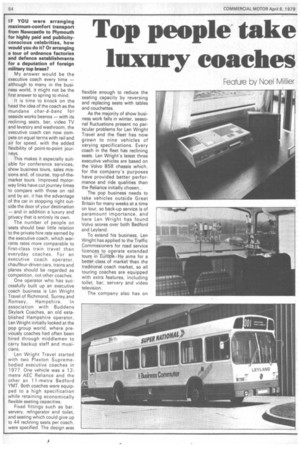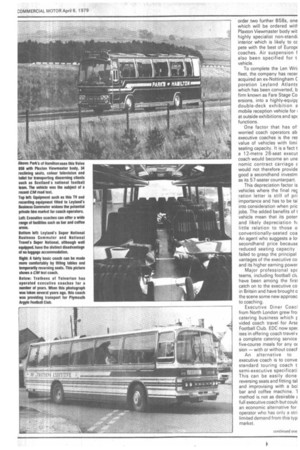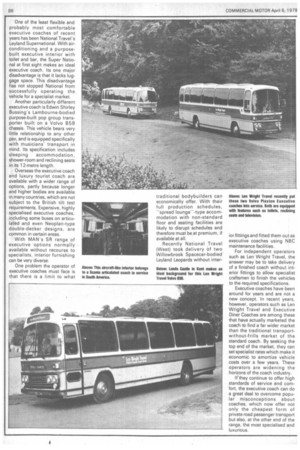Top people take luxury coaches
Page 86

Page 87

Page 88

If you've noticed an error in this article please click here to report it so we can fix it.
Feature by Noel Millier
IF YOU were arranging maximum-comfort transport from Newcastle to Plymouth for highly paid and publicityconscious celebrities, how would you do it? Or arranging a tour of ordnance factories and defence establishments for a deputation of foreign military top brass?
My answer would be the executive coach every time — although to many in the business world, it might not be the first answer to spring to mind.
It is time to knock on the head the idea of the coach as the mundane char-d-banc for seaside works bea nos — with its reclining seats, bar, video TV and lavatory and washroom, the executive coach can now compete on equal terms with rail and air for speed, with the added flexibility of point-to-point journeys.
This makes it especially suitable for conference services, show business tours, sales missions and, of course, top-of-themarket tours. Improved motorway links have cut journey times to compare with those on rail and by air, it has the advantage of the car in stopping right outside the door of your destination — and in addition a luxury and privacy that is entirely its own.
The number of people on seats should bear little relation to the private hire rate earned by the executive coach, which warrants rates more comparable to first-class train travel than everyday coaches. For an executive coach operator, chauffeur-driven cars, trains and planes should be regarded as competition, not other coaches.
One operator who has successfully built up an executive coach business is Len Wright Travel of Richmond, Surrey, and Romsey, Hampshire. In association with Buddens Skylark Coaches, an old established Hampshire operator, Len Wright initially looked at the pop group world, where previously coaches had often been hired through middlemen to carry backup staff and musicians.
Len Wright Travel started with two Plaxton Supremebodied executive coaches in 1977. One vehicle was a 12 metre AEC Reliance and the other an 11-metre Bedford YMT. Both coaches were equipped to a high specification while retaining economically flexible seating capacities.
Fixed fittings such as bar, servery, refrigerator and toilet, and seating which could give up to 44 reclining seats per coach, were specified. The design was flexible enough to reduce the seating capacity by reversing and replacing seats with tables and couchettes.
As the majority of show business work falls in winter, seasonal fluctuations present no particular problems for Len Wright Travel and the fleet has now grown to nine vehicles of varying specifications. Every coach in the fleet has reclining seats. Len Wright's latest three executive vehicles are based on the Volvo B58 chassis which, for the company's purposes have provided better performance and ride qualities than the Reliance initially chosen.
The pop business needs to take vehicles outside Great Britain for many weeks at a time on tour, so back-up service is of paramount importance, and here Len Wright has found Volvo scores over both Bedford and Leyland.
To extend his business, Len Wright has applied to the Traffic Commissioners for road service licences to overate extended tours in Europe. He aims for a better class of market than the traditional coach market, so all touring coaches are equipped with extra features, including toilet, bar, servery and video television.
The company also has on order two further 858s, one which will be ordered witt Plaxton Viewmaster body wit highly specialist non-standi interior which is likely to cc pete with the best of EuropE coaches. Air suspension also been specified for t vehicle.
To complete the Len Wrii fleet, the company has recer acquired an ex-Nottingham C poration Leyland Atlante which has been converted, b firm known as Fare Stage Co ersions, into a highly-equipr double-deck exhibition a mobile reception vehicle for at outside exhibitions and spc functions.
One factor that has of worried coach operators ab executive coaches is the re5 value of vehicles with limi seating capacity. It is a fact t a 12-metre 28-seat execut
coach would become an une nomic contract carriage E.
would not therefore provide good a secondhand investm as its 57-seater counterpart.
This depreciation factor is vehicles where the final rec ration letter is still of pri importance and has to be ta into consideration when pric jobs. The added benefits of I vehicle mean that its poter and likely depreciation Fr little relation to those o conventionally-seated coa An agent who suggests a lo. secondhand price because reduced seating capacity failed to grasp the principal vantages of the executive co and its higher earning power Major professional spc teams, including football cIL have been among the first catch on to the executive co in Britain and have brought o the scene some new approac to coaching.
Executive Diner Coacl from North London grew frol catering business which r vided coach travel for Arse Football Club. EDC now spe( ises in offering coach travel v a complete catering service five-course meals for any or sion — with or without coact An alternative to executive coach is to conve standard touring coach t semi-executive specificati This can be easily done reversing seats and fitting tat and improvising with a bol bar and coffee machine. 1 method is not as desirable E full executive coach but coulc an economic alternative for operator who has only a stri limited demand from this typ market. One of the least flexible and probably most comfortable executive coaches of recent years has been National Travel's Leyland Supernational. With airconditioning and a purposebuilt executive interior with toilet and bar, the Super National at first sight makes an ideal executive coach. Its one major disadvantage is that it lacks luggage space. This disadvantage has not stopped National from successfully operating the vehicle for a specialist market.
Another particularly different executive coach is Edwin Shirley Bussing's Lambourne-bodied purpose-built pop group transporter built on a Volvo B58 chassis. This vehicle bears very little relationship to any other psv, and is equipped specifically with musicians' transport in mind. Its specification includes sleeping accommodation, shower-room and reclining seats in its 12-metre length.
Overseas the executive coach and luxury tourist coach are available with a wider range of options, partly because longer and higher bodies are available in many countries, which are not subject to the British tilt test requirements. Expensive, highly specialised executive coaches, including some buses on articulated and even Neaplan-type double-decker designs, are common in certain areas.
With MAN's SR range of executive 'options normally available without recourse to specialists, interior furnishing can be very diverse.
One problem the operator of executive coaches must face is that there is a limit to what traditional bodybuilders can economically offer. With their full production schedules, "spread lounge"-type accommodation with non-standard floor and seating facilities are likely to disrupt schedules and therefore must be at premium, if available at all.
Recently National Travel (West) took delivery Of two Willowbrook Spacecar-bodied Leyland Leopards without inter ior fittings and fitted them out as executive coaches using NBC maintenance facilities.
For independent operators such as Len Wright Travel, the answer may be to take delivery of a finished coach without interior fittings to allow specialist craftsmen to finish the vehicles to the required specifications.
Executive coaches have been around for years and are not a new concept. In recent years, however, operators such as Len Wright Travel and Executive Diner Coaches are among these that have actually marketed the coach to find a far wider market than the traditional transportwithout-frills market of the standard coach. By seeking the top end of the market, they can set specialist rates which make it economic to amortize vehicle costs over a few years. These operators are widening the horizons of the coach industry.
Ifthey continue to offer high standards of service and comfort, the executive coach can do a great deal to overcome popular misconceptions about coaches, which now offer not only the cheapest form of private road passenger transport but also, at the other end of the range, the most specialised and luxurious.




































































































































































